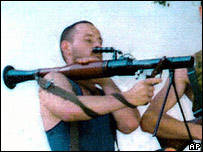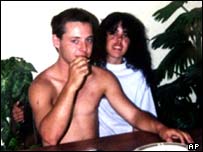Australian-born David Hicks was captured by US forces in Afghanistan in November 2001, while fighting for the then Taleban government.

Concern has grown over David Hicks' ongoing incarceration
|
He was transferred to the US camp at Guantanamo Bay in Cuba in January 2002 where he spent more than five years before finally being tried and convicted of supporting terrorism - the first detainee to go through a US military tribunal there. Although he was formally charged in 2004 with conspiracy, attempted murder and aiding the enemy - to which he pleaded not guilty - the charges were subsequently dropped after a US Supreme Court ruled that the system of military tribunals was unlawful. It was not until February 2007 that Hicks, by now 31, was charged again - this time with providing material support for terrorism. He pleaded guilty on 26 March 2007, when he also withdrew claims that he had been abused by members of the US military while in custody. On 30 March, a military judge accepted Hicks's plea, making him the first person to be formally convicted at the Guantanamo Bay prison camp. Under the terms of a plea bargain with prosecutors, he was given a seven-year sentence to be served in his native Australia. However, he will only have to serve nine months from the date of his conviction. He was flown back to Adelaide on 20 May 2007, and taken to Yalata prison for the remaining seven months of his sentence. He is barred from speaking to the media for 12 months. Public concern Over the last five years, concern at David Hicks' welfare and ongoing detention without trial grew in Australia.

David Hicks fought in the Balkans before heading further east
|
He previously alleged, via his family and lawyers, that he had been beaten and kicked, routinely deprived of sleep and even offered the services of a prostitute to spy on others. In a letter to his family dated August 2004, David Hicks said he was on the brink of madness, and suffered extreme mood swings and confusion brought on by long periods of solitary confinement. The Australian government, which initially did little to interfere with the case, found itself under increasing pressure as public unease deepened - due in part to father Terry Hicks's campaign for action. In particular, Canberra was criticised for not doing more to have David Hicks repatriated to Australia, as the British government did in 2005 with four of its citizens then held in Guantanamo. Australian Prime Minister John Howard has accused some of trying to turn Hicks into a "hero". "He pleaded guilty to knowingly assisting a terrorist organisation - namely, al-Qaeda," Mr Howard said after hearing of the final sentence. Kangaroo-skinner Sometimes known as the Australian Taleban, David Hicks was born in the southern city of Adelaide to Terry and Susan.

David Hicks has two children by his common-law wife Jodie
|
His parents described him as a "typical boy who couldn't settle down" and, as a teenager, he experimented with drink and drugs and was expelled from school at 14. He tried various jobs, including skinning kangaroos at a meat-packing factory and fishing for sharks. While working on a series of cattle ranches in the outback, he met Jodie Sparrow, with whom he had two children. After the couple separated, Hicks decided to become a horse trainer in Japan. One day in 1998, he phoned his parents to tell them he had decided to join an organisation called the KLA. "I thought it was an airline," his father Terry reportedly said. In fact, it was the Kosovo Liberation Army with whom he had decided to fight against the Serbs in the Balkans. His parents said he had found out how to join up on the internet. Islamic convert According to his father, David had changed by the time he returned to Australia. He converted to Islam and soon went to Pakistan, where he joined the banned Kashmiri Islamist group Lashkar-e-Toiba. In occasional telephone calls home, he said he was going on patrols along the border with Kashmir, the war-torn region claimed by both India and Pakistan. At some stage in 2001, David Hicks attended an al-Qaeda training camp in Afghanistan and also participated in an advanced al-Qaeda course on information collection. He has also admitted to carrying out surveillance of various targets in Kabul, including the American embassy. David Hicks's last phone call home to his parents before his capture was from just outside the southern Afghan city of Kandahar in November 2001. "He said something about going off to Kabul to defend it against the Northern Alliance," Terry Hicks said. Weeks later, as the war came to a close, David Hicks was seized by the anti-Taleban Northern Alliance forces in Kandahar and handed into US custody.
|
Bookmark with:
What are these?